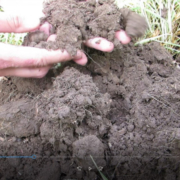Long-term Study Explores Impact of Management Practices on Soil Organic Carbon
Michigan State University scientists published results of a long-term study at the Kellogg Biological Station. “Soil carbon change in intensive agriculture after 25 years of conservation management” explores best practices for building soil carbon through differing management strategies. This study observed soil organic carbon change over 25 years, across 10 different management systems, including annual row crop rotations, managed perennial crops, and conservation lands. This study showed that conventionally managed row crop and late successional forest systems showed stable soil organic content, while no-till, cover crops, and managed herbaceous perennials showed increases. The highest gains occurred in managed perennial and cover-cropped systems, illustrating the effect of minimal disturbance and continuous cover. The study also showed that the rate of soil organic carbon gain slowed after the first 12 years.


 Suzannetmoran, Wikimedia Commons
Suzannetmoran, Wikimedia Commons
